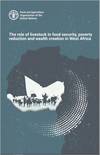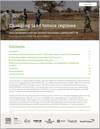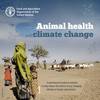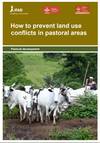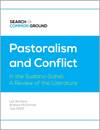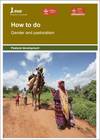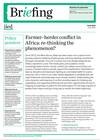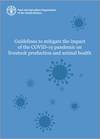With the objective of gaining a better insight into the challenges and opportunities of the livestock sub-sector in West Africa, FAO has conducted several studies and held various workshops in recent years. The outcomes of these studies and workshops conducted between 2009 and 2014 were published and distributed as hard copy reports and disseminated as on-line publications. These reports included topics such as value chains, cross-border transhumance, animal feed resources, priority animal diseases, among others, were informative in their own right. Still, the fact that they targeted specific areas of livestock in a fragmented manner did not address the need of readers whose wish was to have a comprehensive understanding of the livestock sector in West Africa. It is in response to this demand for a comprehensive outlook of the West African Livestock sub-sector that different reports and studies have been compiled into this one book. The book has twelve chapters, covering almost all aspects of livestock in the region. Attempts were made to enrich the information provided by including eight short case studies focusing on different aspects of the livestock sub-sector in West Africa. The book attempts to fill the gap of a need for comprehensive information on the potential, performance, challenges, and prospects of the livestock sub-sector in West Africa.
Year of publication: 2020Organization: Organización de las Naciones Unidas para la Alimentación y la Agricultura (FAO)
Topic: Seguridad alimentaria, Resiliencia, Servicios sociales
Language: English
Type of document: Técnico
Geographical coverage: África Occidental
This brief reviews farming and pastoralist livelihood systems to highlight their evolving and overlapping tenure regimes. It also discusses the increasing pressure on resources that has contributed to strained relationships and in some cases polarization and conflict. Unless this context is well understood, the problems and challenges cannot be effectively addressed. Finally, the brief considers steps needed to take full advantage of available opportunities for building the resilience of these livelihood systems.
Year of publication: 2020Organization: Autores individuales,
Topic: Tierra
Language: English
Type of document: Técnico
Geographical coverage: África Oriental
Livestock support more than 750 million of the world’s poorest people. This brochure makes the case that improving animal health should be an integral part of strategies aimed at food security and sustainable development in the context of climate change. Firstly, to reduce impacts of climate change on animal health and the spread of pathogens – as the majority of emerging diseases have an animal origin. Secondly, to mitigate effects of climate change – as healthier animals are more productive and generate lower emissions per weight of product. Thirdly, to adapt to climate changes – as animals are more resilient than crops to adapt to marginal conditions and withstand climate shocks. To address these challenges, opportunities for action are presented – including developing capacity to tackle animal disease events triggered by climate change, promoting One Health approaches, and investing in public and private collaboration and research. Ongoing FAO activities in these areas are presented including tools, platforms and strategies to track, forecast and support control of disease outbreaks. FAO issues a call to action for strengthened engagement, investment and collaboration at the interface of animal health and climate change in order to improve food security while protecting the planet.
Year of publication: 2020Organization: Organización de las Naciones Unidas para la Alimentación y la Agricultura (FAO)
Topic: Cambio climático
Language: English
Type of document: Boletines
Geographical coverage: Global
This How-to-do Note focuses on how conflicts over land and natural resources in pastoral areas can be prevented or, if already present, transformed into positive outcomes. It identifies why land tenure is a complex issue within pastoralism, discusses the combination of factors that are contributing to more insecure pastoral tenure and triggering pastoral area conflicts, and introduces some of the frameworks, tools and approaches that can be used as part of project design to reduce the potential for conflict.
Year of publication: 2020Organization: Fondo Internacional de Desarrollo Agrícola (FIDA)
Topic: Conflicto, Tierra
Language: English
Type of document: Técnico
Geographical coverage: Global
From Mali to South Sudan, governments, regional bodies, peacebuilders, development agencies, environmentalists, economists, and security forces are actively attempting to address the sources of violence and instability that affect both pastoral communities and the rural societies with whom they share resources and landscapes. These interventions are often shaped by differing assumptions about the source and nature of these conflicts, despite the availability of extensive research and analysis. Though the local dynamics of conflict vary across different contexts, a number of trends and debates appear throughout the literature on pastoralism and conflict. This review draws on several hundred sources to synthesize the major points of consensus and divergence in the existing literature and identify relevant research gaps. This analysis presents data from across Sudano-Sahelian West and Central Africa, to link comparable findings that are often presented in isolation.
Year of publication: 2020Organization: Autores individuales
Topic: Conflicto, Resiliencia
Language: English
Type of document: Técnico
Geographical coverage: África Occidental, África Central
This HTDN complements the IFAD Toolkit and HTDN on Pastoralism produced in 2018, which highlights the importance of gender in pastoral production systems. This How To Do Note (HTDN) on Gender and Pastoralism builds on this introduction highlighting important issues and tools to use to address them. This HTDN is designed for country programme teams, consultants and technical advisors, with the objective of providing guidance on the designing of projects with gender-sensitive interventions targeted at empowering pastoralist women so as to achieve more equitable development. This HTDN is divided into two main sections. Section One identifies the issues that particularly impact pastoralist women and related gender issues and highlights the need for greater women’s empowerment. It introduces the relevant IFAD policies and publications that have helped broaden understanding of gender issues within pastoralism and brings in lessons learned from other agencies. Section Two provides practical guidance that project developers and others can use for more gender-sensitive interventions with pastoralists. Reference materials, as well as gender-focused tools and checklists that can help in project development, are also provided.
Year of publication: 2020Organization: Fondo Internacional de Desarrollo Agrícola (FIDA)
Topic: Género y juventud
Language: English
Type of document: Técnico
Geographical coverage: Global
Pastoralism is seen as disruptive and backward, fighting an unwinnable battle for scarce resources. Yet in truth it is an under-valued adaptation to variability that can make livelihoods and landscapes more climate-resilient. Understanding the roots, dynamics and meaning of conflict, providing space for listening and negotiating, and supporting livelihood and economic opportunities are key to mapping out pathways to peace for the whole region.
Year of publication: 2020Organization: Instituto Internacional de Medio Ambiente y Desarrollo (IIED)
Topic: Conflicto
Language: English
Type of document: Políticas y legislación
Geographical coverage: África Occidental
Guidelines to mitigate the impact of the COVID-19 pandemic on livestock production and animal health
The purpose of these guidelines is to describe the impact of COVID-19 on livestock production and animal disease prevention and control, and to provide practical recommendations for actors along value chains to reduce this impact and ensure continuity of the livestock supply chain and animal health. The target beneficiaries of these guidelines are livestock value chain actors including livestock farmers, slaughterhouse workers, animal product processors, traders, animal health professionals and paraprofessionals, policy makers and other relevant stakeholders.
Year of publication: 2020Organization: Organización de las Naciones Unidas para la Alimentación y la Agricultura (FAO)
Topic: Seguridad alimentaria
Language: English
Type of document: Técnico
Geographical coverage: Global


